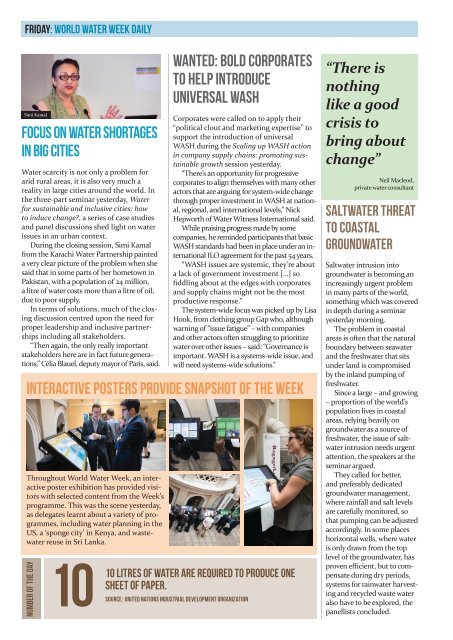World Water Week Daily Friday 2 September, 2016
You also want an ePaper? Increase the reach of your titles
YUMPU automatically turns print PDFs into web optimized ePapers that Google loves.
FRIDAY: WORLD WATER WEEK DAILY<br />
Simi Kamal<br />
FOCUS ON WATER SHORTAGES<br />
IN BIG CITIES<br />
<strong>Water</strong> scarcity is not only a problem for<br />
arid rural areas, it is also very much a<br />
reality in large cities around the world. In<br />
the three-part seminar yesterday, <strong>Water</strong><br />
for sustainable and inclusive cities: how<br />
to induce change?, a series of case studies<br />
and panel discussions shed light on water<br />
issues in an urban context.<br />
During the closing session, Simi Kamal<br />
from the Karachi <strong>Water</strong> Partnership painted<br />
a very clear picture of the problem when she<br />
said that in some parts of her hometown in<br />
Pakistan, with a population of 24 million,<br />
a litre of water costs more than a litre of oil,<br />
due to poor supply.<br />
In terms of solutions, much of the closing<br />
discussion centred upon the need for<br />
proper leadership and inclusive partnerships<br />
including all stakeholders.<br />
“Then again, the only really important<br />
stakeholders here are in fact future generations,”<br />
Célia Blauel, deputy mayor of Paris, said.<br />
NUMBER OF THE DAY<br />
WANTED: BOLD CORPORATES<br />
TO HELP INTRODUCE<br />
UNIVERSAL WASH<br />
Corporates were called on to apply their<br />
“political clout and marketing expertise” to<br />
support the introduction of universal<br />
WASH during the Scaling up WASH action<br />
in company supply chains: promoting sustainable<br />
growth session yesterday.<br />
“There’s an opportunity for progressive<br />
corporates to align themselves with many other<br />
actors that are arguing for system-wide change<br />
through proper investment in WASH at national,<br />
regional, and international levels,” Nick<br />
Hepworth of <strong>Water</strong> Witness International said.<br />
While praising progress made by some<br />
companies, he reminded participants that basic<br />
WASH standards had been in place under an international<br />
ILO agreement for the past 54 years.<br />
“WASH issues are systemic, they’re about<br />
a lack of government investment […] so<br />
fiddling about at the edges with corporates<br />
and supply chains might not be the most<br />
productive response.”<br />
The system-wide focus was picked up by Lisa<br />
Hook, from clothing group Gap who, although<br />
warning of “issue fatigue” – with companies<br />
and other actors often struggling to prioritize<br />
water over other issues – said: “Governance is<br />
important. WASH is a systems-wide issue, and<br />
will need systems-wide solutions.”<br />
INTERACTIVE POSTERS PROVIDE SNAPSHOT OF THE WEEK<br />
Throughout <strong>World</strong> <strong>Water</strong> <strong>Week</strong>, an interactive<br />
poster exhibition has provided visitors<br />
with selected content from the <strong>Week</strong>’s<br />
programme. This was the scene yesterday,<br />
as delegates learnt about a variety of programmes,<br />
including water planning in the<br />
US, a ‘sponge city’ in Kenya, and wastewater<br />
reuse in Sri Lanka.<br />
10<br />
10<br />
LITRES OF WATER ARE REQUIRED TO PRODUCE ONE<br />
SHEET OF PAPER.<br />
SOURCE: UNITED NATIONS INDUSTRIAL DEVELOPMENT ORGANIZATION<br />
“There is<br />
nothing<br />
like a good<br />
crisis to<br />
bring about<br />
change”<br />
Neil Macleod,<br />
private water consultant<br />
SALTWATER THREAT<br />
TO COASTAL<br />
GROUNDWATER<br />
Saltwater intrusion into<br />
groundwater is becoming an<br />
increasingly urgent problem<br />
in many parts of the world,<br />
something which was covered<br />
in depth during a seminar<br />
yesterday morning.<br />
The problem in coastal<br />
areas is often that the natural<br />
boundary between seawater<br />
and the freshwater that sits<br />
under land is compromised<br />
by the inland pumping of<br />
freshwater.<br />
Since a large – and growing<br />
– proportion of the world’s<br />
population lives in coastal<br />
areas, relying heavily on<br />
groundwater as a source of<br />
freshwater, the issue of saltwater<br />
intrusion needs urgent<br />
attention, the speakers at the<br />
seminar argued.<br />
They called for better,<br />
and preferably dedicated<br />
groundwater management,<br />
where rainfall and salt levels<br />
are carefully monitored, so<br />
that pumping can be adjusted<br />
accordingly. In some places<br />
horizontal wells, where water<br />
is only drawn from the top<br />
level of the groundwater, has<br />
proven efficient, but to compensate<br />
during dry periods,<br />
systems for rainwater harvesting<br />
and recycled waste water<br />
also have to be explored, the<br />
panellists concluded.


















